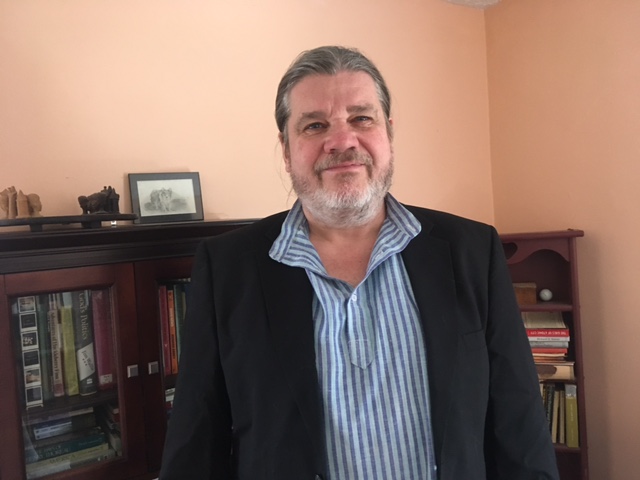When activists write nonacademic articles mainly to persuade (and often to entertain--the fun part of persuading), rhetorical flourishes are inevitable. If one's conscientious, all one can do is try to assure that one's flashier rhetorical riffs--like my recent "Vichy Democrats" coinage--are undergirded by solid, logical arguments. Exchanges with critical commenters on my recent OEN pieces obligate me to justify my use of a term that's hardly my own coinage, but which I consciously employ to ring activist readers' alarm bells. I mean my repeated dropping of that "F-bomb," fascism.

Against Fascism--Let's curtail it while we're still free enough.
(Image by Eric The Fish (2013)) Details DMCA
Having academic background in political philosophy--and more importantly, real love for the subject--I strive never to use language lightly. But naturally, in the heat of passionate activist battle, linguistic caution is frequently the earliest casualty. At least one assurance I'm using fascism with propriety is my success in raising readers' blood pressure. In today's political squabbles, where adversaries unsheathe sharp-edged fighting words on the flimsiest pretext, they rapidly get dulled and lose all effect. Apparently, I'm at least evidence-based enough to hone the F-word's emotional blade.
But so are many demagogues--at least by the low-bar evidence standards of their fawning partisans. That one's pungent rhetoric can pass the sniff t est of none-too-critical critics hardly implies it's ready for the objectivity god's nose. So, my own critics, pulse-quickened but rightly more skeptical than a demagogue's thralls, have set me an important--and highly interesting--challenge: to show that the political dysfunction Americans now face is really a form of fascism. That's what I'll attempt in this essay.
As my title implies, I do not regard fascism and totalitarianism as synonyms. The proper way to view matters is that a very pernicious form of fascism (and of course, the word fascism implies it's pernicious) can exist without totalitarian control; if totalitarianism implies near-total government control over people's lives, it strikes me that government can do a particular sort of grievous harm to its subject population--harm that fully merits the term fascism-- while still falling short of totalitarian dominance. Perhaps the best way of viewing this is that fascism inevitably tends in a totalitarian direction (because excessive power, by a well-documented psychological dynamic, always strives to tighten its grip, often to the point of overreach), but it can often achieve its toxic purposes--and arguably, achieve them more effectively--without any need for total control.
Before giving needed historical justification for my applying the F-word to current circumstances, I wish to pinpoint two practical implications of the fascism-totalitarianism distinction: one alarming and the other quite hopeful. The alarming part is that fascism can fool a nation's people and have them deeply in its grip before they've even noticed--largely because they've confused fascism with totalitarianism, and falsely conclude they're fascism-free because daily life isn't (yet) totally under their government's thumb. The hopeful part is that because fascism can exist for some time without totalitarianism, people can (if sufficiently awakened) still retain enough freedom to fight back and reverse their nation's fascist course. I think ALL these characteristics--except, scarily, the sufficient awakening--exist in today's United States.
But if we're not currently subject to totalitarianism, with what justice do I brandish the alarmist word fascism at all? My justification has roots in history, and is based on extracting the essential features we share in common with historical fascism regimes, while ignoring as mere historical accidents what strikes me as inessential. Naturally, my picking and choosing of what's essential to fascism will be controversial; but because history repeats itself--though never in the same way--I've tried to single out the keys features of fascism that (as current evidence suggests) seem to be historically repeatable. If one insists on replicating every feature of historical fascist regimes, I suspect we might as well fling fascism as a currently applicable term into the trashcan of history. I also suspect that would be a big mistake, for why impoverish thought and discourse by jettisoning a concept that retains both great intellectual utility and obvious rhetorical value (if responsibly applied)? I doubt we'll soon invent a better flash description for this bundle of pernicious phenomena, intertwined by a savage inner logic.
The word pernicious provides the firmest handle for grasping what seems most currently relevant--and perhaps even perennial--in the historical concept of fascism. Not, of course, that whatever any party critical of government perceives as pernicious qualifies; using fascism that way is the very essence of overblown, irresponsible rhetoric. Fascist clearly should not be a synonym for "really, really bad," even if one specifies that the badass badness in question comes from government. But any correct application of fascism must take into account the term's deeply pejorative historic connotations; the "deeply pejorative" part is a necessary if not sufficient condition for correctly applying the fascism concept. For if history is to be our guide, we must add other features to deeply pernicious action by government. Namely, that the deeply pernicious action constitutes the agenda of a minority (what James Madison called a "faction"), and that the agenda is such that from the viewpoint of the common good it's simply insane-- destructive to the very purposes of government and to the lives of many beings within or without a given fascist regime's borders. This is why most historic fascist regimes are associated with aggressive war--and (Mussolini's Italy may be an exception) with committing genocide.
Now clearly, a ruling minority's mere agenda to impose its insanely pernicious will doesn't suffice for defining fascism either, for that trait fits many historical tyrannies. In fact, the very definition of tyranny includes the attempt to impose pernicious minority will; indeed, if that pernicious imposition didn't go so far as to seem insanely destructive, the apparent restraint may have been simply lack of technological means. Just as Catholic theologian Augustine asserted babies were deeply sinful and simply lacked the power to do great harm, so humanity in its technological infancy lacked the power to do insanely destructive harm. So, a key insight about fascism is that it's the characteristically modern, technologically advanced form of tyranny.
The essential modernity of fascism, including its reliance on technology, provides crucial insight into two of its other, seemingly essential characteristics. For part of fascism's modernity is its essential political backdrop: that it develops in a uniquely modern world, a world of widespread democracy, where either (1) democracy (and its usual handmaiden, representative government) is the acknowledged basis of the society or (2) if the government is obviously not representative, it must pay lip service (at minimum) to the will of the people, as enshrined, for example, in the deliciously paradoxical "dictatorship of the proletariat." The most strikingly brilliant insight from Alexis de Tocqueville's Democracy in America-- the very cornerstone of his many penetrating insights--was his understanding that his age, to an unprecedented extent, had let the democracy cat out of the bag and that it could never be shoved back in. So a key part of modernity is that the vast masses of humanity believe (at some level) in democracy, so even the most tyrannical governments must somehow fake it. So fascism is essentially a cancer on democracy, and would not exist without its modern democratic host. Which brings us to the quintessentially modern means by which the fascist spreads: mass propaganda, as enabled by modern communications media.
It's in its absolutely central reliance on mass propaganda that fascism proves its incestuously close relationship with democracy, for a weakened democratic body is the only kind fascism's cancer can grow in. (Not that there aren't truly awful regimes that were never in any sense democratic; my point is that they're simply not fascist.) So far from true is Americans' smug assurance "It can't happen here" that one with far greater justice identifies ours as exactly the sort of society where, if democracy fatally weakens, the cancer of fascism can thrive. Our long brainwashing by electronic media advertising has in many ways been our grade school for graduation to fascism, and it's especially sobering to realize that Goebbels learned much of his satanic bag of tricks from American advertisers.
Quite simply, it's too potentially dangerous--and too disreputably messy--to control large modern populations (especially ones that believe in democracy) by force, so mind control through mass propaganda (and its Siamese twin, censorship) has become the preferred modern means of tyranny. Since fascism is the modern version of tyranny, mind control through mass propaganda, transmitted by modern electronic media, is an essential defining characteristic of fascism. Not that sheer force is outmoded; quite the contrary, it's essential to fascism. But force against the domestic population, when not applied to official scapegoats (see below) is reserved almost exclusively for dissidents uncontrollable by propaganda. Or--and this is the secret of America's huge prison population--for cynical poor outcasts (often unemployed) who could at any time turn dissident if given the political resources. Needless to say, this use of force is either kept "off camera" altogether (censorship) or justified by propaganda. As I noted in my previous OpEdNews article (http://www.opednews.com/articles/Spineless--Vichy-Democra-by-Patrick-Walker-Censorship_Climate_Dissent_Fascism-140224-393.html ), I deeply fear both will effectively cover up the brutality and mistreatment hovering vulture-like over pledgers of civil disobedience against the Keystone XL pipeline.
Perhaps one other trait, closely related to propaganda, is absolutely essential to fascism. The institutions of popular or representative government must be largely, reassuringly kept in place, but they must cease to have any clear relation to justice (especially equal justice) or popular will. A corollary of this is that the most grievous imaginable crimes, if committed by or in favor of the ruling minority, will get mere wrist slaps or go completely unpunished, while those revealing government crimes will be subject to some of the severest penalties under law. The key to this method's success is that the majority, reassured by the continued existence of democratic institutions, simply becomes habituated to their deep perversion. Perhaps our most striking current example is the draconian sentencing (or exile) of publicly useful whistleblowers on government misdeeds like Manning, Hammonds, or Snowden while lying Bush administration perpetrators of one of humanity's worst crimes--unjust aggressive war--build libraries and prosper. So inured are we to such screaming injustices (or perhaps so overwhelmed by the sheer number of them), that I couldn't arouse sufficient interest in a campaign to reverse this one.
Others may cite other features, like permanent war; all-pervasive spying; jingoistic patriotism; ethnic, religious, or ideological scapegoats; ongoing or planned genocide; or a charismatic, all-powerful leader, as essential to fascism, but I'm by no means sure we need insist on these traits. In any case, we currently have versions of the first four (Muslims, especially Arab ones, supplying the ethno-religious scapegoats, and the overlapping category of "America-hating terrorists" the ideological ones). If these four traits aren't essential to fascism, they so logically advance its aims as to be almost so--and as I noted, they're clearly already in play.
As for genocide, I don't think planned genocide on the classic fascist model is essential; what counts is an insane minority agenda deeply, lastingly harmful to a society or vastly many human beings within or without it. I certainly think the murderous, multi-trillion-dollar Iraq and Afghanistan wars fit the bill, and the lethal effects of the Keystone pipeline ("game over for the climate") and our "all of the above" energy policy generally, are likely to dwarf all prior fascist genocides combined in their death toll. The element currently least evident, a charismatic, all-powerful leader, is a feature many deem essential, but given all the other elements currently present--and the insane prospects of harm we're facing--it seems priggish, insight-impoverished literalism to insist on it. Let's save an intellectually valuable term from priggish literalists--and dare call our Voldemort menace by its name.
(Note: You can view every article as one long page if you sign up as an Advocate Member, or higher).





